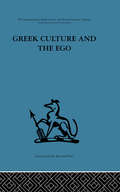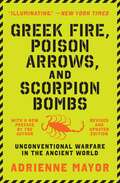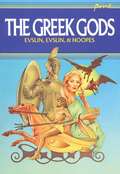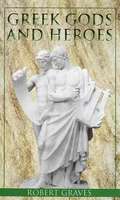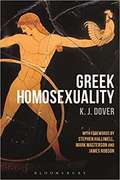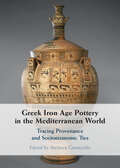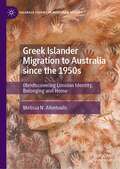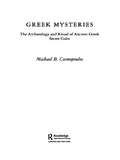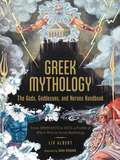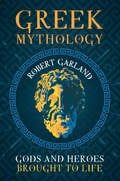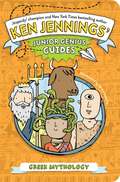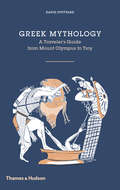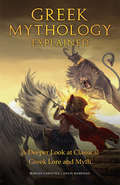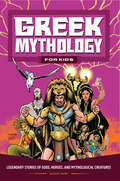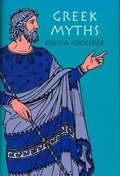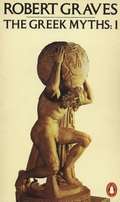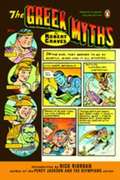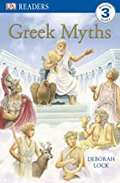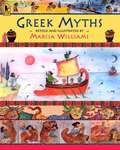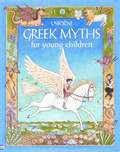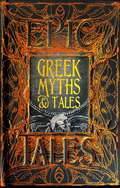- Table View
- List View
Greek Culture and the Ego: A psycho-analytic survey of an aspect of Greek civilization and of art
by Adrian StokesTavistock Press was established as a co-operative venture between the Tavistock Institute and Routledge & Kegan Paul (RKP) in the 1950s to produce a series of major contributions across the social sciences. This volume is part of a 2001 reissue of a selection of those important works which have since gone out of print, or are difficult to locate. Published by Routledge, 112 volumes in total are being brought together under the name The International Behavioural and Social Sciences Library: Classics from the Tavistock Press. Reproduced here in facsimile, this volume was originally published in 1958 and is available individually. The collection is also available in a number of themed mini-sets of between 5 and 13 volumes, or as a complete collection.
Greek Culture in the Roman World: Roman Festivals in the Greek East
by Fritz GrafThis study explores the development of ancient festival culture in the Greek East of the Roman Empire, paying particular attention to the fundamental religious changes that occurred. After analysing how Greek city festivals developed in the first two Imperial centuries, it concentrates on the major Roman festivals that were adopted in the Eastern cities and traces their history up to the time of Justinian and beyond. It addresses several key questions for the religious history of later antiquity: who were the actors behind these adoptions? How did the closed religious communities, Jews and pre-Constantinian Christians, articulate their resistance? How did these festivals change when the empire converted to Christianity? Why did emperors not yield to the long-standing pressure of the Church to abolish them? And finally, how did these very popular festivals - despite their pagan tradition - influence the form of the newly developed Christian liturgy?
Greek Culture in the Roman World: Greek Myths in Roman Art and Culture
by Zahra NewbyImages of episodes from Greek mythology are widespread in Roman art, appearing in sculptural groups, mosaics, paintings and reliefs. They attest to Rome's enduring fascination with Greek culture, and its desire to absorb and reframe that culture for new ends. This book provides a comprehensive account of the meanings of Greek myth across the spectrum of Roman art, including public, domestic and funerary contexts. It argues that myths, in addition to functioning as signifiers of a patron's education or paideia, played an important role as rhetorical and didactic exempla. The changing use of mythological imagery in domestic and funerary art in particular reveals an important shift in Roman values and senses of identity across the period of the first two centuries AD, and in the ways that Greek culture was turned to serve Roman values.
Greek Fire, Poison Arrows, and Scorpion Bombs: Unconventional Warfare in the Ancient World
by Adrienne MayorA gripping and groundbreaking history of how ancient cultures developed and used biological, chemical, and other unconventional weapons of warFlamethrowers, poison gases, incendiary bombs, the large-scale spreading of disease: are these terrifying agents of warfare modern inventions? Not by a long shot. In this riveting history of the origins of unconventional war, Adrienne Mayor shows that cultures around the world have used biological and chemical weapons for thousands of years—and debated the morality of doing so. Drawing extraordinary connections between the mythical worlds of Hercules and the Trojan War, the accounts of Herodotus and Thucydides, and modern methods of war and terrorism, this richly illustrated history catapults readers into the dark and fascinating realm of ancient war and mythic treachery.
The Greek Gods
by Bernard Evslin Dorothy Evslin Ned HoopesThis book is an excellent introduction to Greek mythology, and includes a glossary, afterword, and bibliography.
Greek Gods and Heroes
by Robert Graves"Almost all arts and useful sciences were given us by the ancient Greeks: such as astronomy, mathematics, engineering, architecture, medicine, money, literature, and law. Even modern scientific language is mostly formed from Greek words. They were the first people in Europe to write books, and two long poems by Homer--about the siege of Troy and the adventures of Odysseus--are still read with pleasure though he lived more than seven hundred years before the birth of Christ. After Homer came Hesiod, who wrote among other things about gods, and fighting men, and the Creation. The Greeks greatly respected Homer and Hesiod, and the stories (now called "myths") which they and other poets told, became part of school education not only in Greece, but wherever the Greek language had spread--from Western Asia to North Africa and Spain."-Introduction
Greek Homosexuality
by K. J. DoverHailed as magisterial when it first appeared, Greek Homosexuality remains an academic milestone and continues to be of major importance for students and scholars of gender studies. Kenneth Dover explores the understanding of homosexuality in ancient Greece, examining a vast array of material and textual evidence that leads him to provocative conclusions. <p> This new release of the 1989 second edition, for which Dover wrote an epilogue reflecting on the impact of his book, includes two specially commissioned forewords assessing the author's legacy and the place of his text within modern studies of gender in the ancient world.
Greek Iron Age Pottery in the Mediterranean World: Tracing Provenance and Socioeconomic Ties
by Stefanos GimatzidisGreek pottery is the most visible archaeological evidence of social and economic relations between the Aegean and the Mediterranean during the Iron Age, a period of intense mobility. This book presents a holistic study of the earliest Greek pottery exchanged in Greek, Phoenician, and other Indigenous Mediterranean cultural contexts from multidisciplinary perspectives. It offers an examination of 362 Protogeometric and Geometric ceramic and clay samples, analysed by Neutron Activation, that Stefanos Gimatzidis obtained in twenty-four sites and regions in eight countries. Bringing a macro-historical approach to the topic through a systematic survey of early Greek pottery production, exchange, and consumption, the volume also provides a micro-history of selected ceramic assemblages analysed by a team of scholars who specialise in Classical, Near Eastern, and various prehistoric archaeologies. The results of their collaborative archaeological and archaeometric studies challenge previous reconstructions of intercultural relations between the Aegean and the Mediterranean and call into question established narratives about Greek and Phoenician migration.
Greek Islander Migration to Australia since the 1950s: (Re)discovering Limnian Identity, Belonging and Home (Palgrave Studies in Migration History)
by Melissa N. AfentoulisIlluminating the experiences of immigrants to Australia in the late twentieth century, this book uses oral history to explore how identity and belonging are shaped through migration. Between the 1950s and the 1970s, many inhabitants from the small Greek island of Limnos travelled to Australia to flee post-war devastation and economic disaster. With an emphasis on the lived experiences and memories of Limnians, the book sheds light on the emotional pain and trauma they felt as they were separated from their families and homeland. Moving away from more traditional outlooks on migration studies, this book emphasises the significance of ethno-regional identity, and analyses how it can bring strength and longevity to a constructed community. Both the roles of men and women within the Greek diaspora are examined, in the way that they made the difficult decision to leave their homeland, and subsequently how they came to nurture and build families within a new, evolving community. Looking beyond first-generation migration, the author analyses the pattern of return visits to Limnos by the descendants of migrants. Acting as a form of identity consolidation for second-generation migrants, this journey to the ancestral homeland highlights the fluidity of what it means to belong somewhere, and redefines the notion of ‘home’. The author provides an alternative perspective to traditional migration studies and reaffirms the importance of transnational identity. A unique and important addition to research, this book combines memory studies and oral narrative to analyse how identity and belonging can be shaped across borders, rather than within them.
Greek Mysteries: The Archaeology of Ancient Greek Secret Cults
by Michael B. CosmopoulosWritten by an international team of acknowledged experts, this excellent book studies a wide range of contributions and showcases new research on the archaeology, ritual and history of Greek mystery cults. With a lack of written evidence that exists for the mysteries, archaeology has proved central to explaining their significance and this volume is key to understanding a phenomenon central to Greek religion and society.
Greek Mythology: From Aphrodite to Zeus, a Profile of Who's Who in Greek Mythology (World Mythology and Folklore)
by Liv AlbertFinally sort out who&’s who in Greek mythology—from gods, goddesses, heroes, monsters, and everyone in between!Greek mythology continues to appear in popular movies and books today but have you ever wondered about where these characters started out? Discover the origins of your favorite characters from Greek mythology with this collection of profiles to tell you who&’s who in classical lore! In Greek Mythology, you will discover the backstories of the heroes, villains, gods, and goddesses that enjoy popularity in today&’s shows and films. With comprehensive entries that outline each character&’s name, roles, related symbols, and foundational myths, you can get to know the roots of these personas and better understand the stories they inspire today. With this character-focused, handy reference, you will never be confused about Ancient Greece!
Greek Mythology: Gods and Heroes Brought to Life
by Robert GarlandThe timeless stories of Greek mythology come to life in these reimagined tales written in the voices of Zeus, Oedipus, Odysseus, and many others.Though the gods are featured prominently in Greek mythology, there is nothing sacred about it. Anyone is free to bring their own interpretation to these stories, just as Homer, Sophocles, and Euripides did centuries ago. In this volume, classicist and author Robert Garland presents nearly forty Greek legends as told by the characters themselves. Telling their stories from their own perspectives, the famous characters of Greek mythology—both gods and mortals—are given a chance to reflect on their lives and defend actions. Each story is accompanied by historical commentary, making Greek Mythology: Gods and Heroes Brought to Life an engaging and accessible way to enjoy these timeless tales.
Greek Mythology: Gods and Heroes Brought to Life
by Robert GarlandThe timeless stories of Greek mythology come to life in these reimagined tales written in the voices of Zeus, Oedipus, Odysseus, and many others.Though the gods are featured prominently in Greek mythology, there is nothing sacred about it. Anyone is free to bring their own interpretation to these stories, just as Homer, Sophocles, and Euripides did centuries ago. In this volume, classicist and author Robert Garland presents nearly forty Greek legends as told by the characters themselves. Telling their stories from their own perspectives, the famous characters of Greek mythology—both gods and mortals—are given a chance to reflect on their lives and defend actions. Each story is accompanied by historical commentary, making Greek Mythology: Gods and Heroes Brought to Life an engaging and accessible way to enjoy these timeless tales.
Greek Mythology (Ken Jennings’ Junior Genius Guides)
by Ken JenningsUnleash your inner genius and become a master of mythology with this interactive trivia book from Jeopardy! champ and New York Times bestselling author Ken Jennings.With this Junior Genius Guide to Greek mythology, you’ll become an expert and wow your friends and teachers with all the best ancient stories: how Prometheus outsmarted the gods, how Achilles’s heel led to his death, and how we mere mortals always seem to get mixed up in so many misadventures. With great illustrations, cool trivia, and fun quizzes to test your knowledge, this guide will have you on your way to whiz-kid status in no time!
Greek Mythology: A Traveler's Guide
by David StuttardA hands-on traveler's guide to the enthralling tales of Greek mythology, organized around the cities and landscapes where the events are set The Greek myths have a universal appeal, beyond the time and physical place in which they were created. But many are firmly rooted in specific landscapes: the city of Thebes and mountain range Cithaeron dominate the tale of Oedipus; the city of Mycenae broods over the fates of Agamemnon and Electra; while Knossos boasts the scene of Theseus' slaying of the Minotaur. Drawing on a wide range of classical sources, newly translated by the author, and illustrated with specially commissioned drawings, this book is both a useful read for those visiting the sites and a fascinating imaginative journey for the armchair traveler. The itinerary includes twenty-two locations, from Mount Olympus to Homer's Hades, recounting the myths and history associated with each site and highlighting features that visitors can still see today. Scholarly text, supported by quotes from primary sources and contemporary research, as well as the enticing stories of gods and goddesses, heroes and villains, enrich the reader's literal or simply literary experience of these sites, whose significance still resonates today.
Greek Mythology Explained: A Deeper Look at Classical Greek Lore and Myth
by Marios Christou David RamenahA unique retelling of Greek mythological tales featuring love, betrayal, murder and ruthless ambitions—for fans of George R. R. Martin’s Game of Thrones.Discover six classic Greek myths in this exciting retelling that paints both famous and lesser-known characters in a whole new light. Follow the likes of Odysseus, Lamia, Bellerophon, Icarus, Medusa and Artemis as their fates are revealed through bloody trials, gut-wrenching betrayals, sinister motives and broken hearts. With an accessible writing style that delves into the thoughts, feelings, desires, and motivations of every character, these mythical figures and their compelling stories will resonate with readers as they are guided through perilous and tragic adventures.Greek Mythology Explained provides an in-depth analysis of each story told as it unravels the greater themes and valuable lessons hidden within each chapter. Inside these pages, you’ll . . .Sail with Odysseus as he navigates through the straits of Messina with a terrifying monster on each side, intent only on killing him and his crew.Witness Lamia’s world turned upside down as she loses her kingdom, her children and her humanity.Journey with Bellerophon as he battles the Chimera and becomes the hero that he was destined to be.Take flight with Icarus and Daedalus as they escape their confinement and the Cretan navy.Follow Medusa as she loses faith in the gods and becomes the monster she so adamantly wished to protect her people from.Experience the love between Artemis and Orion, as well as the bitter jealousy it spawns at the core of her brother Apollo.
Greek Mythology for Kids: Legendary Stories of Gods, Heroes, and Mythological Creatures
by Zachary HambyWhether you're fighting alongside Zeus in the war against the Titans or witnessing the sabotage of Artemis's love for the mortal Orion, this Greek mythology book for kids 8 to12-year-olds will thrill with extraordinary stories from Greek legend! Greek gods and goddesses continue to capture our imaginations with tales of epic battles and star-crossed love. Experience adventure and enchantment with this book about Greek mythology.Greek Mythology for Kids has it all:Classic characters—Dive into 20 exciting, kid-friendly tales featuring the antics of favorite characters like Aphrodite, the goddess of love, Hermes, messenger of the gods, and Persephone, queen of the underworld. Dramatic illustrations—Watch the awe-inspiring world of Greek mythology come to life with the bold art in the style of a graphic novel for kids. A guide to the Greeks—Learn who did what and where with a handy guide to characters and locations that makes exploring Greek mythology fun and easy. Venture into the unknown with Greek Mythology for Kids!
Greek Myths
by Olivia E. Coolidge Edouard SandozFrom the terror of Medusa and the Minotaur to the Labors of Heracles and journeys of Theseus, the stories in this collection have thrilled and enthralled people for centuries with their high drama, hazardous quests, and unforgettable characters (both mortal and immortal). Under Olivia Coolidge#146;s skillful pen, the landscape of early Greece and its famous legends bloom with vigor and are perfectly suited to the adventure-seeking reader.
The Greek Myths
by Robert GravesCombines in a single volume the complete text of the definitive two-volume classic, citing all the ancient myths.
The Greek Myths
by Robert GravesThe Greek Myths is the definitive and comprehensive edition of Robert Graves's classic imaginative and poetic retelling of the Greek myths. 'Icarus disobeyed his father's instructions and began soaring towards the sun, rejoiced by the lift of his great sweeping wings. Presently, when Daedalus looked over his shoulder, he could no longer see Icarus; but scattered feathers floated on the waves below. . . 'Including many of the greatest stories ever told - the labours of Hercules, the voyage of the Argonauts, Theseus and the minotaur, Midas and his golden touch, the Trojan War and Odysseus's journey home - Robert Graves's superb and comprehensive retelling of the Greek myths for a modern audience has been regarded for over fifty years as the definitive version. With a novelist's skill and a poet's eye, Graves draws on the entire canon of ancient literature, bringing together all the elements of every myth into one epic and unforgettable story. Ideal for the first time reader, it can be read as a single, continuous narrative, while full commentaries, with cross-references, interpretations, variants and explanations, as well as a comprehensive index of names, make it equally valuable as a work of scholarly reference for anyone seeking an authoritative and detailed account of the gods, heroes and extraordinary events that provide the bedrock of Western literature. The result is a classic among classics, a treasure trove of extraordinary tales and a masterful work of literature in its own right. 'Among the most generous, self-willed, unseemly and brilliant writers of our century' New York Times Robert Graves (1895 - 1985) was a novelist, poet, historian, critic and translator, author of some 140 books, and one of the greatest figures of 20th century British literature. Alongside The Greek Myths, his most famous works include the historical novels I, Claudius and Claudius the God and his First World War memoir Goodbye to All That. His friendship with fellow war poet Siegfried Sassoon was the subject of Pat Barker's novel Regeneration.
Greek Myths (Dk Readers Level 3 Ser.)
by Deborah LockThis book introduces the child to the pantheon of Greek gods and goddesses and the myths surrounding them.
The Greek Myths
by Ross Macdonald Robert Graves Rick RiordanRobert Graves, classicist, poet, and unorthodox critic, retells the Greek legends of gods and heroes for a modern audience And, in the two volumes of The Greek Myths, he demonstrates with a dazzling display of relevant knowledge that Greek Mythology is "no more mysterious in content than are modern election cartoons." His work covers, in nearly two hundred sections, the creation myths; the legends of the births and lives of the great Olympians; the Theseus, Oedipus, and Heracles cycles; the Argonaut voyage; the tale of Troy, and much more. All the scattered elements of each myth have been assembled into a harmonious narrative, and many variants are recorded which may help to determine its ritual or historical meaning, Full references to the classical sources, and copious indexes, make the book as valuable to the scholar as to the general reader; and a full commentary on each myth explains and interprets the classical version in the light of today's archaeological and anthropological knowledge.
Greek Myths
by Marcia WilliamsGreek myths are among the most exciting stories ever told. In this collection, Williams retells eight myths using simple language and a unique comic-strip format. <P><P>Panels and spreads brimming with color and nonstop action make each tale a pleasure to look at and voice balloons add modern humor. The perfect way to introduce young readers to the power of myths.
Greek Myths For Young Children
by Heather Amery Jenny Tyler Linda Edwards Amanda BarlowThe Greek myths are a fascinating part of our cultural heritage, and young children will find these stories of gods, mortals and monsters irresistible. This collection of the best-known stories are retold in a magical and sensitive way.
Greek Myths & Tales: Epic Tales (Gothic Fantasy)
by Flame Tree StudioA potent pantheon of gods, heroes engaged in epic battles, fearsome mythical creatures and supernatural transformations – such fantastical elements infuse Greek myths with a wonder and excitement that&’s hard to beat. These tales of love, courage, conflict and intrigue, shared for thousands of years, still exercise a powerful influence on our modern lives.
